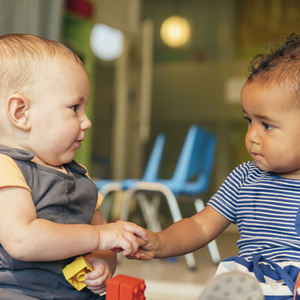Sick Season - 5 Places With Mass Amounts of Germs
Posted by Kelsey Johnson on 11th Mar 2020
This time of year most of us are concerned about Influenza and now Coronaviras. Moms especially worry for their little ones. Many mommas have to work in order to support their family and that can cause even more stress since they may have to leave their precious little ones either in daycare, preschool or public school, which are common places for germs to congregate and spread. Plus many people have to travel for work, and all of us have to get groceries eventually.. But there are some practical steps each of us can take to do our part to help prevent the spread of dangerous germs.
First let’s discuss briefly some public places to limit our use of since they are swarming with germs:
 Busy Malls, Shopping Centers or Grocery Stores
Busy Malls, Shopping Centers or Grocery Stores
Of course we cannot completely avoid all of these places. All of us need clothes and especially groceries, but we can be prepared to the best of our ability to combat the many germs we will come into contact with. We can do so by carrying hand sanitizer on us at all times. Using disinfectant wipes on all shopping cart handles and remembering to use hand sanitizer after touching public surfaces. Keep in mind that ATM’s, pens or card machines, and self-checkout stations are also germ magnets! Hand sanitizer is your friend!!
 Packed Movie Theaters or Live Performances
Packed Movie Theaters or Live Performances
Once again these are places that are hard to avoid completely because we all love movies, music and so forth. If you decide to go to one of these places use hand sanitizer and avoid touching your face (eyes and nose).
 Cruise Ships
Cruise Ships
Who doesn't want to escape the cold, wet weather? Remember with all of those people in close contact it is a perfect place for germs to spread fast! To be safe, before you travel you can check the US State Department website for travel and safety warnings about your destination.
 Daycare - Shocker Right?!
Daycare - Shocker Right?!
Haha just kidding. We are all aware that children don't normally understand how important it is to wash hands, cover their mouths, and that their hands are not a proper tissue. Sadly the flu is especially serious when it comes to children, especially those five years old or younger. They are at higher risk for complications related to the flu, according to the CDC. They often use their hands to wipe their nose, touch their eyes, and then play with toys and touch other children. It may not be possible to avoid sending your children to daycare. In that case you can check with the center about their flu/sickness policies, and whether children who have a fever or other flu symptoms are sent home or can continue to stay. Licensed childcare providers may be required to report an outbreak. You should also check with the center about the measures they take to promote good hygiene, like if toys and surfaces are properly sanitized.
 Airplanes, Buses, Trains
Airplanes, Buses, Trains
Enclosed spaces makes it easier for sicknesses to spread. Avoiding air travel may not be possible. In that case it is a good idea to use hand sanitizer frequently, wipe down your tray table and the surfaces around you with sanitizing wipes, and use restrooms on the ground as much as possible.
Anywhere there are a lot of people in close contact will be swarming with nasty germs. With many viruses, a person can be contagious and not even be aware of it. Be vigilant!! Use disinfectant wipes and always carry hand sanitizer. If you are anything like me, I love natural products for me and my family. That’s why I like to use DAYSPA Body Basics hand sanitizer. It naturally kills 99.5% of germs. It is 62% Ethyl Alcohol which is an antiseptic, and is scented from pure essential oils.
Now that we have discussed some places that germs thrive, lets discuss some ways we can protect ourselves and others. The following “good health habits” can go a long way to help prevent the flu and stop germs in their tracks according to the CDC.
- Avoid close contact with those who are sick.
- Make sure you cover your nose and mouth with a tissue when you cough or sneeze. Throw the tissue in the trash after you use it.
- Wash your hands often with soap and water.
- Avoid touching your eyes, nose, and mouth.
- Clean and disinfect surfaces and objects that may be contaminated.
- Stay home for at least 24 hours after your fever is gone without the use of fever-reducing drugs.
Flu season can be worrisome, but remember we all can do our part to help prevent the further spread of germs. Be vigilant and be safe!! If you would like further information on good health habits that prevent the spread of germs and lower your risk of getting sick, check out our blog on washing hands, and also our blog on how we can protect our homes from dangerous germs.
